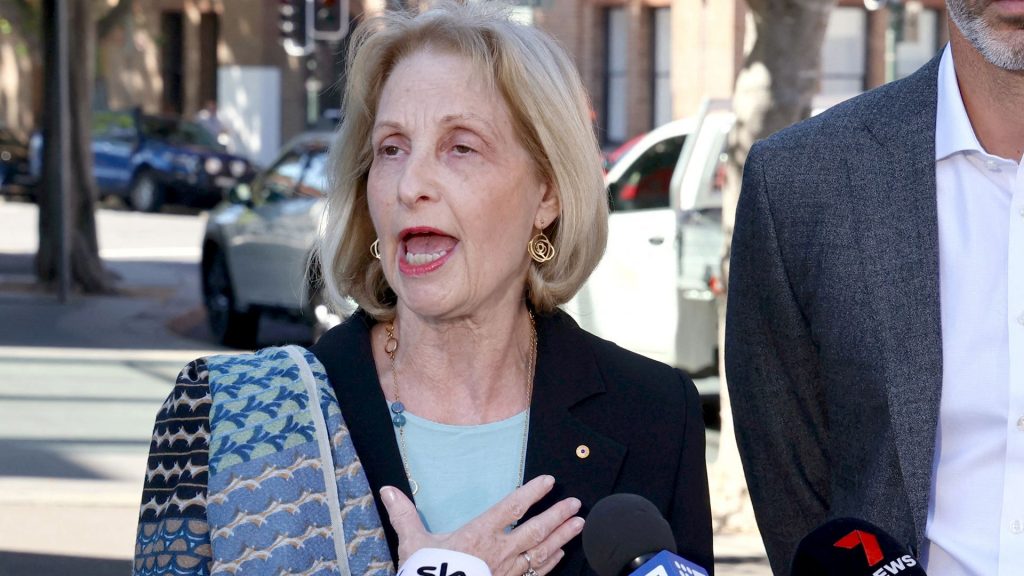Australia says institutions could lose funding amid rising antisemitism

Australia warns universities could lose funding if they fail to address antisemitism on campus. Jillian Segal, the nation’s antisemitism envoy, unveiled a plan Thursday detailing steps universities, cultural institutions and other organizations should take to combat attacks on Jewish Australians.
“Antisemitism is an evil scourge and there is no place in Australia for antisemitism. The kind of hatred and violence that we have seen on our streets recently is despicable and it won’t be tolerated, and I want those responsible to face the full force of the law,” said Australian Prime Minister Anthony Albanese.
Australian government will consider plan to combat antisemitism
Albanese said the Australian government will review the recommendations. Speaking at a press conference, he acknowledged a rise in antisemitic attacks across the country, including arson at synagogues and vandalism of homes. Authorities have charged hundreds of individuals in connection with these incidents.
Albanese said the conflict in the Middle East has contributed to the rise, but “reaffirms the fact that antisemitism didn’t begin on October 7.”
Segal said the 20-page plan is not just symbolic, it’s a call to action targeting antisemitism in legislation, universities, workplaces and public institutions.
In announcing the plan, she said, “We will look at whether it is now necessary to strengthen hate crime legislation, including provisions relating to not only incitement and vilification and prohibitive symbols which we have, but actual hatred and the speaking of hatred and demonstrated hatred. We need to look at this.”
Report receives pushback
The Jewish Council of Australia, a Jewish organization that “supports Palestinian freedom & justice and opposes antisemitism & racism,” has pushed back against the report, arguing the plan threatens democratic freedoms, deepens division and focuses on one form of racism while advancing a political agenda.
“The report is riddled with misinformation and claims about nefarious funding sources for protests and universities that verge on conspiracy theory,” a press release states.
Instead, the Council wants the government to tackle all forms of racism, including Islamophobia and anti-Palestinian bias. They also warn against measures that could limit civil liberties in the name of protecting Jewish safety.
“Consistent with her past statements erroneously linking antisemitic attacks with Palestine solidarity protests, Segal seems fixated on driving a pro-Israel narrative and repressing legitimate criticism of Israel’s genocide in Gaza,” said Dr. Max Kaiser, executive officer of the Jewish Council of Australia.
What does the report detail?
According to the report, between Oct. 2023 and Sept. 2024, antisemitic incidents in Australia rose 316%, with over 2,000 reported cases involving threats, assaults, vandalism or intimidation. In October and November of 2023 alone, such incidents surged more than 700% compared to the previous year. The report explains that the figures do not include antisemitic content online.
In the report, Segal said there has been an increase in extremist ideologies spreading online and offline in the past 18 months. Research by the antisemitism envoy shows a sharp generational divide: Australians under 35 consume different media and hold different views of the Middle East and the Holocaust than older Australians. This data informed the envoy’s plan, which included new educational measures in schools, universities, on social media and in sports.
According to the report, gaps remain despite new hate crime laws. Antisemitism is still showing up in universities, cultural spaces and public institutions. In 2024, more than 60% of Jewish students who faced antisemitism said they felt unsupported by their schools.
A report from the Zionist Federation of Australia and other organizations found that nearly two-thirds of Jewish university students have faced antisemitism on campus. It also showed that 57% have hidden their Jewish identity at some point to avoid being harassed.
What are western countries doing to combat antisemitism?
The International Holocaust Remembrance Alliance, or IHRA, developed a working definition of antisemitism that has become the model many countries use to guide their policies and efforts in identifying and addressing antisemitism.
Under President Donald Trump, the U.S. took a tougher approach to fighting antisemitism at the federal level, including cutting or freezing funding for universities like Harvard and Columbia.
Australia and the U.S. aren’t alone. According to the European Commission, they’ve been working on measures to protect Jews since 2021. The strategy outlines steps to prevent all forms of antisemitism, protect Jewish communities and promote Holocaust education and remembrance.
The Canadian government is using education, advocacy and partnerships to protect human rights, aiming not only to safeguard its Jewish population but also to help future generations understand the history of the Holocaust.
In 2024, Argentina’s Ministry of Foreign Affairs in Buenos Aires hosted a significant gathering where 36 countries, including the UK, signed onto new Global Guidelines for Countering Antisemitism.
Lord Eric Pickles, the UK Special Envoy for Post-Holocaust Issues, emphasized that while adopting definitions, such as the IHRA’s non-binding framework, is a good start, putting those initiatives into action is far more challenging.





